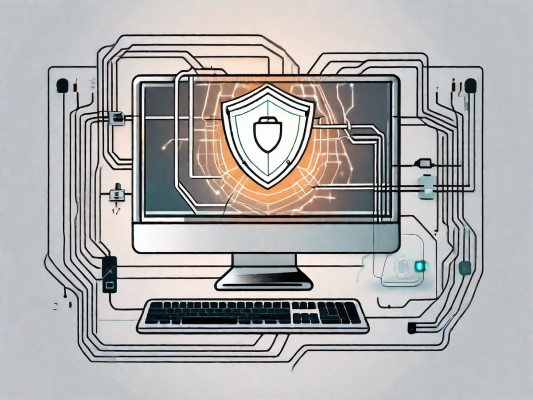The Best Entry Level Cyber Security Jobs
16 Nov, 20235
Contents
- Understanding the Cyber Security Landscape
- The Importance of Cyber Security in Today's World
- Key Skills Required for a Career in Cyber Security
- Exploring Entry-Level Cyber Security Roles
- Security Analyst: Your First Step into Cyber Security
- Incident Responder: The Frontline of Cyber Defense
- Cyber Security Specialist: Protecting Information Assets
- Penetration Tester: Simulating Cyber Attacks to Improve Security
- Educational Pathways to Cyber Security Jobs
- Degree Programs vs. Certifications: What's Right for You?
- Self-Learning Resources: Online Courses and Bootcamps
- The Role of Internships and Apprenticeships in Gaining Experience
- Essential Certifications for Entry-Level Professionals
- CompTIA Security+: A Foundation for Beginners
- Certified Ethical Hacker (CEH): An Introduction to Ethical Hacking
- Cisco's CCNA Security: Networking Security Basics
The digital landscape has rapidly evolved, making cyber security an essential component of modern society. Understanding the importance of cyber security and the skills required to excel in this field is crucial for anyone considering a career in this dynamic industry. This comprehensive guide will explore entry-level cyber security roles, educational pathways, and essential certifications, providing a roadmap for aspiring professionals looking to embark on a rewarding journey in cyber security.
Understanding the Cyber Security Landscape
In today's interconnected world, where data breaches and cyber attacks pose significant threats to individuals, businesses, and governments, the importance of cyber security cannot be overstated. Cyber security professionals play a vital role in safeguarding valuable information and protecting digital infrastructure from malicious actors. As the demand for skilled cyber security experts continues to grow, individuals with a passion for technology and a strong commitment to mitigating cyber threats have an opportunity to pursue diverse and rewarding career paths in this dynamic field.
When it comes to cyber security, the landscape is constantly evolving. New threats emerge, and hackers find innovative ways to exploit vulnerabilities in systems. This ever-changing environment requires professionals to stay ahead of the curve, constantly updating their knowledge and skills to effectively combat cyber threats.
The Importance of Cyber Security in Today's World
With cyber attacks becoming increasingly sophisticated and pervasive, organisations across various industries are prioritising their cyber security efforts to prevent data breaches, secure sensitive information, and maintain the trust of their stakeholders. From financial institutions and healthcare providers to government agencies and technology companies, the need for cyber security professionals spans across diverse sectors, creating a wealth of employment opportunities for individuals looking to enter this rapidly expanding field.
One of the primary reasons why cyber security is so crucial in today's world is the sheer volume of data that organisations handle. From personal information to trade secrets, businesses and governments store a vast amount of sensitive data that, if compromised, can have severe consequences. Cyber security professionals are tasked with developing and implementing robust security measures to protect this data, ensuring its confidentiality, integrity, and availability.
Moreover, the interconnectedness of our digital infrastructure means that a breach in one system can have far-reaching consequences. A single vulnerability can be exploited to gain access to multiple systems, potentially causing widespread damage. Cyber security professionals must not only focus on securing individual systems but also consider the broader implications of a breach and work towards building a resilient and interconnected security ecosystem.
Key Skills Required for a Career in Cyber Security
Effective communication, problem-solving abilities, attention to detail, and a deep understanding of technology and security principles are fundamental skills sought after in the cyber security industry. In addition to technical expertise, professionals in this field must stay up-to-date with the latest security trends, possess critical thinking skills, and be able to adapt to evolving threats and technologies. Those with a passion for continuous learning and a proactive approach to addressing security challenges are well-positioned to thrive in the dynamic world of cyber security.
One crucial aspect of a cyber security professional's role is the ability to think like a hacker. By understanding how attackers think and operate, professionals can anticipate their moves and develop effective countermeasures. This requires a combination of technical knowledge, creativity, and a willingness to think outside the box.
Another essential skill in the field of cyber security is the ability to work under pressure. Cyber attacks can occur at any time, and professionals must be able to respond swiftly and decisively to mitigate the impact. This often involves working long hours, collaborating with cross-functional teams, and making critical decisions under stressful conditions.
Furthermore, ethical considerations play a significant role in the cyber security landscape. Professionals must adhere to strict ethical guidelines and ensure that their actions align with legal and moral standards. This includes respecting privacy rights, maintaining confidentiality, and conducting thorough investigations while respecting the rights of individuals involved.
Exploring Entry-Level Cyber Security Roles
Embarking on a career in cyber security often begins with entry-level roles that provide individuals with the foundational experience and knowledge needed to advance in the field. These entry-level positions offer an excellent opportunity for aspiring professionals to gain practical insights into the complexities of cyber security and make valuable contributions to their respective organisations.
Security Analyst: Your First Step into Cyber Security
As a security analyst, individuals are tasked with monitoring networks, detecting potential security breaches, and implementing security measures to protect an organisation's systems and data. This role serves as a foundational stepping stone for aspiring cyber security professionals, providing hands-on experience in identifying and responding to security incidents while developing a strong understanding of security protocols, tools, and best practices.
Incident Responder: The Frontline of Cyber Defense
Incident responders play a critical role in swiftly addressing and mitigating security incidents, such as cyber attacks and data breaches. These professionals are responsible for conducting investigations, analysing security breaches, and implementing corrective actions to prevent future incidents. The role of an incident responder requires a combination of technical expertise, analytical skills, and the ability to collaborate effectively with cross-functional teams in high-pressure environments.
Cyber Security Specialist: Protecting Information Assets
Cyber security specialists focus on developing and implementing comprehensive security measures to safeguard sensitive information, systems, and applications. These professionals assess vulnerabilities, design security solutions, and collaborate with stakeholders to ensure that security policies and procedures align with business objectives. By cultivating a deep understanding of security frameworks and risk management principles, cyber security specialists play a crucial role in fortifying an organisation's defenses against cyber threats.
Penetration Tester: Simulating Cyber Attacks to Improve Security
Penetration testers, also known as ethical hackers, simulate cyber attacks to identify vulnerabilities in systems and applications. By conducting controlled assessments, they provide organisations with valuable insights into potential security weaknesses, ultimately helping to strengthen defenses and enhance overall security posture. This role demands a blend of technical prowess, creativity, and ethical decision-making to effectively uncover and address security vulnerabilities.
Educational Pathways to Cyber Security Jobs
When pursuing a career in cyber security, individuals have various educational pathways to consider, including degree programs, certifications, self-learning resources, and hands-on experiential opportunities. Understanding the different options available and determining the best fit based on individual learning preferences and career aspirations is essential for aspiring cyber security professionals.
Degree Programs vs. Certifications: What's Right for You?
Obtaining a degree in a relevant field, such as computer science, information technology, or cyber security, can provide a comprehensive educational foundation and signal to potential employers a commitment to the field. On the other hand, industry-recognised certifications, such as CompTIA Security+ or Certified Ethical Hacker (CEH), offer targeted and practical knowledge that can quickly validate an individual's expertise in specific areas of cyber security. Assessing personal learning styles, career goals, and time constraints can help determine whether pursuing a degree or obtaining certifications—or a combination of both—aligns best with one's professional ambitions.
Self-Learning Resources: Online Courses and Bootcamps
Online courses and bootcamps offer flexible and accessible pathways for individuals to acquire cyber security skills and knowledge. Platforms like Coursera, Udemy, and Codecademy provide a wide range of cyber security courses, allowing learners to develop technical competencies and gain practical insights into the industry. Additionally, participating in cyber security bootcamps can offer immersive, hands-on experiences and networking opportunities that can accelerate one's entry into the field.
The Role of Internships and Apprenticeships in Gaining Experience
Internships and apprenticeships present invaluable opportunities for individuals to gain hands-on experience, establish professional connections, and apply classroom knowledge to real-world scenarios. These experiential learning opportunities enable aspiring cyber security professionals to immerse themselves in the industry, develop practical skills, and gain exposure to diverse facets of cyber security, ultimately enhancing their employability and readiness for entry-level positions.
Essential Certifications for Entry-Level Professionals
Securing industry-recognised certifications can significantly enhance the credibility and marketability of aspiring cyber security professionals, validating their expertise and proficiency in specific domains of cyber security. Whether pursuing roles as security analysts, incident responders, cyber security specialists, or penetration testers, obtaining relevant certifications can demonstrate a commitment to professional development and a strong foundation in key areas of cyber security.
CompTIA Security+: A Foundation for Beginners
The CompTIA Security+ certification serves as an excellent starting point for individuals entering the cyber security field, covering essential security concepts, risk management, cryptography, and network security principles. This certification equips professionals with a broad understanding of security fundamentals, preparing them for entry-level roles and providing a solid foundation for advanced certifications and career progression.
Certified Ethical Hacker (CEH): An Introduction to Ethical Hacking
For individuals interested in ethical hacking and vulnerability assessment, the Certified Ethical Hacker (CEH) certification offers a comprehensive exploration of ethical hacking techniques, penetration testing methodologies, and cybersecurity best practices. This certification demonstrates proficiency in understanding and mitigating cyber threats, making it an invaluable asset for professionals pursuing roles in penetration testing and security analysis.
Cisco's CCNA Security: Networking Security Basics
Aspiring professionals seeking to specialise in network security can benefit from obtaining Cisco's CCNA Security certification, which focuses on the foundational principles of securing network infrastructure, implementing core security technologies, and mitigating network threats. This certification equips individuals with the knowledge and skills required to address network vulnerabilities and protect critical assets, establishing a strong foothold in the realm of network security.
By understanding the landscape of cyber security, exploring entry-level roles, evaluating educational pathways, and obtaining essential certifications, aspiring professionals can embark on a fulfilling and impactful journey in the field of cyber security. Engaging in continuous learning, staying abreast of industry developments, and embracing the challenges of the ever-evolving cyber landscape are key components of building a successful career in this dynamic and essential industry. Get in touch today to explore how we can support you on this journey and help you achieve your goals in the dynamic and essential cybersecurity industry.



